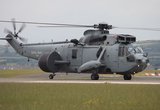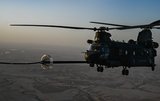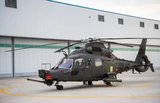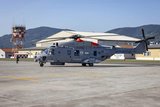National Audit Office reports on MoD Major Projects
The current defence programme is unaffordable, according to a report from the National Audit Office.
The Ministry of Defence has already reduced the deficit between the defence budget and planned expenditure by £15 billion, but a shortfall of between £6 billion and £36 billion remains.
The financial crisis means a substantial increase in funding is unlikely, and closing the gap will require bold action as part of the Strategic Defence Review which is expected after the General Election.
To address the deficit the Ministry of Defence has reduced equipment numbers being bought on some projects and taken short-term decisions to slip other projects. This short-term approach to savings will lead to long-term cost increases. In 2008-09, costs on the 15 major defence projects examined by the NAO increased by £1.2 billion, with two thirds of this increase (£733 million) directly due to the decision to slow projects. Attempting to save money in this way does not address the fundamental affordability problems, increases through-life costs and represents poor value for money on the specific projects affected.
One example of a project slowed is the Queen Elizabeth Class aircraft carriers. Although this action is forecast to save £450 million in the next four years, it is forecast to add £1,124 million in costs in subsequent years. This is a net increase in the forecast cost of £674 million. The NAO judges that this is poor value for money.
On some projects, the MOD has taken the decision to reduce the amount of equipment being purchased. For example, the MOD has taken the decision to save £194 million by reducing Lynx Wildcat numbers by 23 per cent, from 80 to 62 helicopters. This has reduced planned flying hours by a third.
These actions make it difficult to conclude on the effectiveness of the delivery of individual projects. Analysis by the NAO suggests signs of improvement in project cost control with innovative decisions being taken to ensure progress. Unless the MOD addresses the underlying budgetary and governance issues it will not consistently deliver value for money nor, vitally, will the operational benefits of expensive new capabilities be available to the Armed Forces in a timely manner or in the numbers originally planned.
As part of its annual review of major defence projects, the National Audit Office has found that the current cost of 15 major military projects has risen by £3.6 billion, compared with the expected costs when the investment decisions were taken. The total slippage, averaged over the 14 major projects with in service dates, is over two years per project.
Amyas Morse, head of the National Audit Office, said today: "The Ministry of Defence has a multi-billion pound budgetary black hole which it is trying to fix with a 'save now, pay later' approach. This gives a misleadingly negative picture of how well some major projects in MOD are managed, represents poor value for money and heightens the risk that the equipment our Armed Forces require will not be available when it is needed or in the quantities promised. Bold action will be required to prioritise defence spending as part of the planned Strategic Defence Review after the General Election."
In response, Minister for Defence Equipment and Support Quentin Davies said: “This report focuses on the top thirty of almost two thousands projects managed by the MoD in the last financial year. During that time our priority has been - and continues to be - operations in Afghanistan and ensuring that our forces on the frontline have the equipment they need and that is one reason why some projects that are not essential for current operations have been delayed.
“Since 2006, we have delivered equipment valued at more than £10 billion to the Armed Forces. Over the last financial year, we spent a further £1 billion on more than 250 urgent operational requirements for the front line. These have included contracts for more protected vehicles which are now being delivered in large numbers, and upgraded helicopters.
“We fully accept the need to address shortcomings in our long-term equipment planning and that is why we are working on a Strategy for Acquisition Reform, which will be published in the New Year.”
The NAO’s report says that there are encouraging signs of improving cost and time performance in the management of individual projects and singles out the Lynx Wildcat as a good example.
The NAO also notes that as a result of decisions taken to release resources for higher priorities the MOD was able to commit hundreds of million of pounds to improving infantry combat equipment – one of a series of decisions that have led to better support for operations.
The MoD has also established an eight point plan to address the key findings of the Bernard Gray report into defence acquisition. Among the measures in the plan are commitments to holding a Strategic Defence Review after the next general election; ensuring the equipment plan is aligned with strategy and is affordable and realistic; establishing a new sub-committee of the Defence Board; and introducing controls over the entry of new projects to the equipment programme.
MoD’s other key achievements during the year of the report included:
• acceptance by MOD of the first Type 45 destroyer, Daring;
• delivery to the RAF of two Sentinel “eye in the sky” planes;
• start of deliveries of the second batch of RAF Typhoon fighters;
• contracts awarded for more than 700 new protected patrol vehicles;
• a contract awarded for a new fleet of Terrier armoured engineer vehicles;
• the placing of orders for two new Queen Elizabeth class aircraft carriers;
• return to service of Trident submarine HMS Victorious after a major refit.
Since 2006, the MOD has delivered equipment valued at nearly £14 billion to the Armed Forces and since 2003 spent more than £5 billion on Urgent Operational Requirements for the front line.
The MoD will respond formally and fully to the NAO in due course.
More from Defence Helicopter
-
![Germany to send WS-61 Westland Sea King helicopters to Ukraine]()
Germany to send WS-61 Westland Sea King helicopters to Ukraine
Germany has committed to sending Ukraine six of its 21 retiring WS-61 Westland Sea King multirole, amphibious helicopters.
-
![Boeing secures $271 million to advance modernisation of US Special Operations' MH-47G Chinook]()
Boeing secures $271 million to advance modernisation of US Special Operations' MH-47G Chinook
Boeing has clinched a major contract modification to further its backing of the US Special Operations Command’s MH-47G Chinook aircraft modernisation effort.
-
![Dubai Airshow 2023: South Korean homegrown helicopters make international debut]()
Dubai Airshow 2023: South Korean homegrown helicopters make international debut
Two KAI helicopters, the KUH-1E utility helicopter and the Light Attack Helicopter (LAH), have taken centre stage at the Dubai Airshow 2023.
-
![Italian Navy receives final NH90 helicopter]()
Italian Navy receives final NH90 helicopter
The Italian Navy now boasts a fleet of 56 NH90 helicopters comprising 46 SH-90As and 10 MH-90As.
-
![Argentina seeks AW109 and CH-46 Sea Knight helicopters]()
Argentina seeks AW109 and CH-46 Sea Knight helicopters
The Argentinian Air Force (FAA) and the Argentinian Naval Aviation Command (COAN) are looking for options to upgrade their helicopter fleets.
-
![DSEI 2023: Lockheed to produce about 40% of Black Hawks on UK soil if it wins NMH contest]()
DSEI 2023: Lockheed to produce about 40% of Black Hawks on UK soil if it wins NMH contest
Lockheed Martin promises a boost to the British job market and export opportunities, while strengthening ties with Poland and positioning the UK for a future in rotorcraft technology in the event of a New Medium Helicopter competition triumph.


























